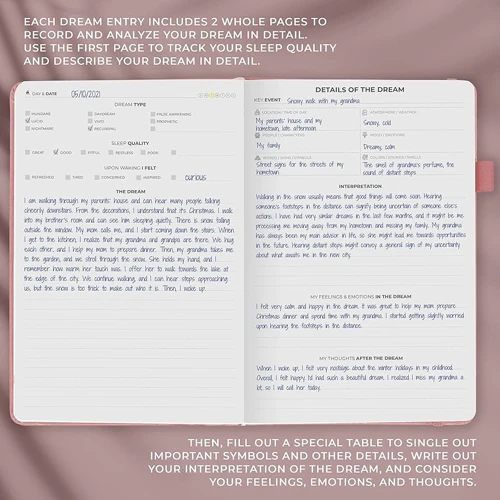Have you ever found yourself wandering aimlessly through the hallways of your dreams, feeling lost and disoriented? Being lost in dreams can be a perplexing experience, leaving you with a sense of confusion and frustration. This article delves into the emotions that accompany being lost in dreams, such as anxiety, fear, and helplessness, and explores the reasons behind these feelings. We will also provide you with practical tips on how to navigate these emotions, including self-reflection, developing lucid dreaming techniques, and seeking support and guidance. By journaling and interpreting your dreams, you can uncover valuable insights and bring the lessons learned into your waking life. So, let’s embark on this journey together as we unravel the mysteries behind being lost in dreams.
What Does It Mean to Be Lost in Dreams?

Being lost in dreams can be a disorienting and perplexing experience. It is a state where you navigate through the landscapes of your subconscious mind, feeling disconnected from your surroundings and unsure of your purpose. This sense of being lost goes beyond the physical aspect of not knowing your location; it delves into the deeper realms of emotional and psychological confusion. In dreams, being lost often symbolizes a lack of direction or clarity in your waking life. It may indicate feelings of being overwhelmed, uncertain, or lacking a sense of purpose or fulfillment. The significance of being lost in dreams can vary depending on the context and individual experiences. While some dreams may point to unresolved issues or conflicts, others can highlight unconscious feelings of insecurity or loss. Exploring the symbolism behind feeling lost in dreams can provide valuable insights into your innermost thoughts and emotions. By interpreting these dreams, you can gain a better understanding of yourself and your emotions, and even find ways to overcome fear and anxiety. So, let’s delve deeper into the emotions associated with feeling lost in dreams and discover strategies to navigate through these dreamscapes. (Link: Exploring the Symbolism of Feeling Lost in Dreams)
Emotions Associated with Being Lost in Dreams

Feeling lost in dreams evokes a range of intense and often puzzling emotions. One common emotion is confusion and frustration, as the dreamer tries to make sense of their surroundings and find their way. The disorientation and inability to navigate through the dream world can lead to a deep sense of frustration. Additionally, anxiety and fear often accompany the feeling of being lost in dreams. The unknown can be intimidating, and the fear of never finding one’s way back or being trapped in the dream can cause great distress. Lastly, a sense of helplessness and vulnerability permeates the experience of being lost in dreams. The dreamer may feel powerless in their inability to regain control or find a resolution. Understanding and addressing these emotions associated with being lost in dreams is crucial for personal growth and self-discovery. (Link: Tips for Overcoming Fear and Anxiety in Dreams)
Confusion and Frustration
Confusion and frustration are two common emotions experienced when feeling lost in dreams. The confusion stems from the disorientation of not knowing where you are or how to navigate through the dream’s environment. You may find yourself in unfamiliar places, unable to find your way back or move forward. This lack of direction can lead to frustration, as you try desperately to find a solution or make sense of your situation. These emotions can be intensified by the dream’s vividness and the inability to wake up from the disorienting experience. It’s important to recognize that these feelings are a natural response to the unfamiliar and bewildering nature of dreams. Understanding the significance of these emotions in dreams can provide valuable insights into your waking life. By exploring common scenarios of feeling lost in dreams and their significance, you can gain a better understanding of the underlying emotions and patterns in your own dream experiences. (Link: Common Scenarios of Feeling Lost in Dreams and Their Significance)
Anxiety and Fear
Feeling lost in dreams can often trigger a surge of anxiety and fear, intensifying the already disorienting experience. These emotions arise from a sense of helplessness and vulnerability that comes with not knowing where you are or how to find your way back. The anxieties and fears in dreams can mirror those from your waking life, reflecting underlying concerns and insecurities. The fear of the unknown, fear of failure, or fear of being alone can manifest during these dream episodes.
Anxiety and fear while being lost in dreams can lead to a heightened state of alertness and unease. Your heart may race, and you may experience sweaty palms or a sense of impending danger. These feelings can be especially overwhelming if accompanied by vivid and realistic dream scenarios. It is essential to remember that dreams are a product of your subconscious mind, and while they can evoke real emotions, they are not a representation of tangible threats. Acknowledging this distinction can help alleviate some of the anxiety and fear that arises during these dream experiences.
To cope with anxiety and fear while feeling lost in dreams, you can practice relaxation techniques such as deep breathing, meditation, or visualization. These strategies can help calm your mind and create a sense of inner peace, enabling you to navigate through the dream with a clearer focus. Additionally, finding ways to cultivate a sense of safety and security in your waking life can help reduce overall anxiety and fear, making the experience of being lost in dreams less distressing. (Link: Tips for Overcoming Fear and Anxiety in Dreams)
Helplessness and Vulnerability
Helplessness and vulnerability are common emotions experienced when feeling lost in dreams. In these dream states, you may find yourself unable to find your way or make sense of your surroundings, leading to a sense of powerlessness. The feeling of helplessness can stem from a lack of control over the dream narrative or the inability to alter the dream’s outcome. This sense of vulnerability arises from the unfamiliarity and uncertainty that comes with being lost. In these dreams, you might encounter unfamiliar landscapes, people, or situations, leaving you feeling exposed and susceptible to the unknown. It is important to note that these emotions are a manifestation of your subconscious fears and anxieties rather than any real danger. While it can be unsettling to experience helplessness and vulnerability in dreams, it presents an opportunity for self-reflection and growth. By acknowledging and addressing these emotions, you can work towards building resilience and a sense of inner strength.
Reasons Behind Feeling Lost in Dreams

There are several reasons why you may feel lost in your dreams, each of them rooted in different aspects of your subconscious mind. One reason is unresolved issues or conflicts that you may be grappling with in your waking life. These unresolved matters can manifest in your dreams as feelings of being lost and uncertain. Another reason could be a lack of direction or purpose in your daily life. If you are experiencing a period of confusion or uncertainty, it may be reflected in your dreams as a sense of being lost. Additionally, dreams of feeling lost can be triggered by a recent loss or experience of grief. The emotions associated with loss often find their way into our dreams, leaving us feeling disoriented and adrift. Lastly, there may be unconscious feelings of insecurity causing you to feel lost in your dreams. These deep-seated insecurities can surface during sleep and contribute to the overall feeling of being lost. By understanding the reasons behind feeling lost in dreams, you can gain insight into your subconscious mind and take steps towards resolving these underlying issues. (Link: Common Scenarios and Significance of Feeling Lost in Dreams)
Unresolved Issues or Conflicts
Unresolved issues or conflicts in our lives can manifest in our dreams, leaving us with a sense of being lost. Dreams have a way of bringing our unconscious thoughts and emotions to the surface, and when we have unresolved issues or conflicts, they can become prominent themes in our dreams. These dreams may reflect the struggles we face, the decisions we need to make, or the relationships that are causing us distress. Being lost in these dreams can symbolize the uncertainty and confusion we feel when trying to navigate through these unresolved issues. It serves as a reminder that there are unresolved matters in our lives that require attention and closure. By paying attention to the details and emotions in these dreams, we can gain insights into the areas of our lives that need resolution. This self-reflection can help us identify the underlying causes of our feelings of being lost and take steps towards resolving them in our waking life. Whether it’s having difficult conversations, seeking therapy, or making changes in our behavior, addressing these unresolved issues or conflicts can bring a sense of clarity and direction to both our dreams and our waking life experiences.
Lack of Direction or Purpose in Waking Life
Feeling lost in dreams can often be attributed to a lack of direction or purpose in one’s waking life. This means that individuals may find themselves adrift in their dreams because they are experiencing similar feelings of uncertainty and aimlessness in their day-to-day reality. When we lack direction or purpose, we may feel like we are lacking a sense of meaning or fulfillment. This can manifest in dreams as a disconnection from our surroundings and a constant search for something that feels elusive. It’s important to take a step back and examine our waking lives to determine if we are truly aligned with our goals and values. Reflecting on our ambitions, interests, and passions can help us gain clarity and find a sense of purpose. Engaging in activities that bring us joy and fulfillment can also help combat the feeling of being lost. By actively seeking out experiences that align with our values and goals, we can regain a sense of direction and purpose in both our waking life and our dreams. (Link: Tips for Overcoming Fear and Anxiety in Dreams)
Loss or Grief
Loss or grief can be a significant factor behind the feeling of being lost in dreams. When we experience loss or go through the grieving process, it can deeply impact our subconscious mind. Dreams often serve as a way for our minds to process and work through intense emotions associated with loss. Whether it’s the loss of a loved one, a relationship, a job, or even a cherished possession, grief can manifest itself in our dreams as a sense of being adrift and disconnected. These dreams may reflect the longing for what has been lost and the struggle to find a new sense of identity or purpose. The emotions tied to loss or grief in dreams can be overwhelming, ranging from sadness and despair to anger and confusion. It is important to recognize and acknowledge these feelings, allowing yourself to grieve and heal in both your waking and dream states. Exploring the symbolism and themes within your dreams related to loss or grief can provide insights into the healing process and help you navigate through the emotional landscapes of your dreams. By seeking support from loved ones, therapy, or support groups, you can find comfort and guidance in processing your loss and finding ways to move forward. (Link: Tips for Overcoming Grief and Loss)
Unconscious Feelings of Insecurity
Unconscious feelings of insecurity play a significant role in the experience of being lost in dreams. Insecurity stems from a deep-seated fear of inadequacy or vulnerability and can manifest in various aspects of our lives, including our dreams. When we feel lost in our dreams, it may be an indication of underlying insecurities that we may not be consciously aware of. These insecurities can stem from experiences of rejection, failure, or a lack of self-confidence. During these dreams, we may find ourselves wandering aimlessly, unable to find our way back or make sense of our surroundings. This can trigger feelings of anxiety, fear, and helplessness, intensifying the perception of being lost. It is crucial to acknowledge and address these unconscious feelings to bring about healing and self-growth. Identifying the root causes of insecurity through self-reflection and therapy can be a helpful step towards overcoming these feelings. By building self-esteem, setting realistic goals, and practicing self-compassion, we can gradually alleviate unconscious feelings of insecurity and reduce the frequency of feeling lost in dreams.
Navigating the Emotions of Being Lost in Dreams

Navigating the emotions of being lost in dreams can be a challenging task. It requires a deep level of self-reflection and analysis to unravel the underlying meanings and messages within these dreams. One approach is to engage in self-reflection, taking the time to explore your thoughts, emotions, and experiences that may be contributing to the feeling of being lost. Additionally, developing lucid dreaming techniques can empower you to take control of your dreams, allowing you to consciously navigate through the dream landscapes and gain a sense of empowerment. Seeking support and guidance from trusted individuals, such as therapists or dream experts, can also provide valuable insights and assistance in understanding and processing these emotions. By employing these strategies, you can navigate the emotions of being lost in dreams and gain a deeper understanding of yourself and your subconscious.
Self-Reflection and Analysis
Self-reflection and analysis play a crucial role in navigating the emotions behind being lost in dreams. When you find yourself feeling disoriented and uncertain in your dreams, it is essential to take a step back and examine your thoughts, emotions, and experiences both in the dream and in your waking life. Begin by reflecting on the details of the dream itself, such as the scenery, people, and events. Are there any recurring themes or symbols that stand out? Pay attention to your emotions during the dream and upon waking up – are you feeling anxious, fearful, or confused? These emotions can provide valuable clues about underlying issues or unresolved conflicts in your life. Engage in introspection to explore and analyze these emotions and their possible connections to your waking life experiences. Ask yourself probing questions: What aspects of your life are making you feel lost or uncertain? Are there any decisions or situations that you need to address? Explore any patterns or recurring themes that emerge from your dreams and see if they resonate with your current circumstances. Self-reflection can help you uncover hidden meanings and gain insights into your subconscious mind. By examining your dreams and reflecting on your emotions, you can take proactive steps towards addressing unresolved issues, finding clarity, and regaining a sense of direction in both your dreams and waking life.
Developing Lucid Dreaming Techniques
Developing lucid dreaming techniques can be a powerful tool in navigating the emotions of being lost in dreams. Lucid dreaming is the practice of becoming aware that you are dreaming while you are still in the dream state. This awareness allows you to take control of the dream narrative and guide your experience. It can provide a sense of empowerment and reduce feelings of helplessness and vulnerability. There are several techniques you can explore to develop your ability to have lucid dreams. Reality checks are a common technique where you question your reality throughout the day, making it a habit to ask yourself, “Am I dreaming?” This habit will eventually carry over to your dream state, triggering lucidity. Another technique is keeping a dream journal. By regularly recording your dreams, you become more in tune with your dream patterns, making it easier to recognize when you are dreaming. Additionally, practicing meditation and visualization before bed can enhance your ability to enter a lucid dream state. By visualizing yourself becoming aware in your dreams, you prime your mind for the experience. Lucid dreaming allows you to actively participate in your dreams, giving you the opportunity to explore and find clarity within the dream landscapes. (Link: Tips for Overcoming Fear and Anxiety in Dreams)
Seeking Support and Guidance
When you find yourself feeling lost in dreams, seeking support and guidance can be immensely helpful. It’s important to remember that you don’t have to navigate these dreamscapes alone. Connecting with others who have experienced similar emotions in their dreams can provide you with a sense of validation and understanding. Joining online dream forums or communities can be a great way to share your experiences and gain insights from others. Additionally, consider reaching out to a therapist or a dream analyst who specializes in dream interpretation. These professionals can help you explore the deeper meanings behind your dreams and offer guidance on how to navigate the emotions associated with being lost. Another valuable source of support is engaging in dream therapy groups or workshops, where you can learn from experts and connect with individuals who are also on a journey of self-discovery through their dreams. Seeking support and guidance not only provides you with a different perspective on your dreams but also allows you to build a support system that can assist you in interpreting and processing your dream experiences. Remember, reaching out for help is a sign of strength, and together, you can uncover the insights hidden within your dreams. (Link: Common Scenarios and Significance of Being Lost in Dreams)
Dream Journaling and Interpretation

Dream journaling and interpretation can be powerful tools in understanding the meaning and significance of being lost in dreams. Keeping a dream journal involves writing down your dreams as soon as you wake up, capturing as many details as possible. This practice helps solidify the memory of the dream and allows you to reflect on it later. When it comes to interpreting your dreams, it’s essential to approach them with curiosity and an open mind. Look for recurring themes, symbols, or emotions that arise when you feel lost in your dreams. Pay attention to any connections between your dreams and your waking life experiences. Journaling can help reveal patterns, triggers, or unresolved issues that are manifesting in your dream state. Additionally, consider seeking the insights of dream experts or engaging in conversations with others who may have similar experiences. Their perspectives can provide new perspectives and interpretations that you may not have considered. Remember, dream interpretation is highly personal, and what holds meaning for one person may be different for another. By engaging in dream journaling and interpretation, you can unlock the hidden messages and insights offered by your dreams, helping you navigate the emotions behind being lost in dreams and applying those insights to your waking life.
Bringing the Lessons into Waking Life
Bringing the lessons learned from your dreams into waking life is a crucial step in personal growth and self-discovery. It’s one thing to explore and interpret the meaning behind being lost in dreams, but it’s another to integrate those insights into your daily life. Here are a few strategies to help you bring the lessons from your dreams into waking life:
1. Reflect on the Emotions: Take some time to reflect on the emotions you experienced while being lost in your dreams. Identify any patterns or recurring themes that may be present. Are there underlying emotions, such as fear or anxiety, that are also present in your waking life? Recognizing these emotions allows you to address and work through them in your daily activities.
2. Identify Parallel Situations: Look for similarities between the situations or experiences in your dreams and your waking life. Are there any parallel situations that require your attention or decision-making? Use the insights gained from your dreams to approach these situations with a fresh perspective and navigate them more effectively.
3. Take Inspired Action: Dreams can provide inspiration and guidance. Use the insights gained from being lost in dreams to take inspired action in your waking life. Take steps towards resolving conflicts, pursuing your goals, or making positive changes. Trust your intuition and the wisdom gleaned from your dreams to guide you in making decisions that align with your authentic self.
4. Create a Vision Board or Journal: Visualize your dreams and the lessons learned by creating a vision board or journal. Use images, words, and quotes that represent your dreams and the emotions associated with being lost. This serves as a daily reminder and helps you stay focused on the insights gained.
5. Seek Support: If you find it challenging to incorporate the lessons from your dreams into your waking life, don’t hesitate to seek support. Share your experiences with a trusted friend, therapist, or counselor who can provide guidance and help you navigate through any challenges.
By actively incorporating the lessons learned from your dreams into your waking life, you can experience personal growth, gain clarity, and live a more fulfilling and purposeful life. Embrace the wisdom of your dreams and let them be a catalyst for positive change.
Conclusion
In conclusion, being lost in dreams is a complex experience that can evoke a range of emotions and serve as a reflection of our inner thoughts and struggles. The confusion and frustration, anxiety and fear, and feelings of helplessness and vulnerability associated with being lost in dreams can be overwhelming. However, by understanding the reasons behind these emotions, we can navigate through these dreamscapes with greater clarity and purpose. Self-reflection, analysis, and developing lucid dreaming techniques can empower us to take control of our dreams and find meaning in our subconscious wanderings. Seeking support and guidance from others can also provide valuable insights and perspectives. Dream journaling and interpretation offer a pathway to decipher the symbolism and messages behind feeling lost in dreams, enabling us to gain self-awareness and bring the lessons learned into our waking lives. Remember, being lost in dreams is not something to fear, but rather an opportunity for personal growth and exploration. So embrace the mysteries of your dreams, and let them guide you towards greater understanding and fulfillment in both your sleeping and waking hours.
Frequently Asked Questions
1. Why do we often feel lost in dreams?
Feeling lost in dreams can stem from a variety of factors, including unresolved issues, lack of direction in waking life, loss or grief, and unconscious feelings of insecurity. Dreams are complex and can reflect our subconscious thoughts and emotions.
2. Is being lost in dreams a common experience?
Yes, many people have experienced the sensation of being lost in dreams at some point. It is a common dream theme that can occur for various reasons and can evoke a range of emotions.
3. What emotions are typically associated with being lost in dreams?
Emotions such as confusion, frustration, anxiety, fear, helplessness, and vulnerability are often associated with being lost in dreams. These emotions can vary in intensity and may depend on the dream’s context and the individual’s experiences and feelings.
4. Can being lost in dreams have any positive meanings?
Yes, being lost in dreams can have positive meanings as well. It may symbolize a need for self-reflection, a desire for change or exploration, or serve as a reminder to pay attention to certain aspects of your life that require further consideration or action.
5. How can self-reflection help in navigating the emotions of being lost in dreams?
Self-reflection involves introspection and analyzing your thoughts, feelings, and experiences. By reflecting on the emotions and symbolism of being lost in dreams, you can gain insights into your subconscious mind and uncover underlying issues or patterns that may be influencing your emotions.
6. What are lucid dreaming techniques, and how can they help in feeling less lost in dreams?
Lucid dreaming involves becoming aware that you are dreaming while in the dream state. By practicing lucid dreaming techniques, such as reality checks, keeping a dream journal, and setting intentions before sleep, you can gain more control over your dreams and potentially reduce the feeling of being lost.
7. Is seeking support and guidance beneficial for navigating the emotions of being lost in dreams?
Absolutely. Seeking support and guidance from trusted friends, family, or even therapists can provide valuable perspectives and insights. They can help you process your emotions, offer guidance, and assist you in making sense of the underlying meanings behind being lost in dreams.
8. How can dream journaling and interpretation be helpful?
Dream journaling involves recording your dreams in detail upon waking. By keeping a dream journal, you can start to identify patterns, themes, and recurring symbols in your dreams. Interpretation of these symbols can provide insights into your subconscious thoughts and emotions, aiding in understanding and navigating the feelings of being lost.
9. How can the lessons learned from being lost in dreams be applied to waking life?
The lessons from being lost in dreams can be applied to waking life by reflecting on the emotions and symbolism encountered in dreams. By understanding the underlying meanings and addressing any unresolved issues or emotions, you can make meaningful changes, find direction, and ultimately enhance your waking life experiences.
10. Can being lost in dreams be a sign of something deeper?
Being lost in dreams can sometimes signify deeper emotional or psychological issues that may need attention. If the feelings of being lost persist or cause significant distress, it could be beneficial to consult a mental health professional for further exploration and guidance.








